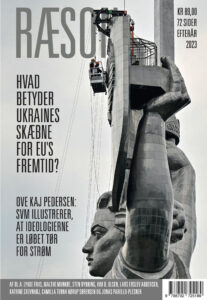
Professor Karim Makdisi: “The US, Europe and Israel will try to keep Mubarak in power”
29.01.2011
.According to professor Karim Makdisi at the American University in Beirut, the protests sweeping Egypt is a youth-driven, fragmented movement which is sure to see the fall of the Mubarak regime: “Israel, and the US, have already lost a close friend in Tunisia, now they are worried about an even closer friend in Egypt”. He continues: “The United States are with the Mubarak-regime, because Mubarak supports US policy in the region and is very close to Israel. Yet the US is going to have to reconsider its role in the region in light of recent events”. And he adds: “If the US withdrew their support from Mubarak, he would fall tomorrow.”
Dr. Karim Makdisi is an Assistant Professor of International Relations and International Environmental Policy at the American University of Beirut. Please note: A Danish translation of this interview is being prepared; this is the English version
Interview by Julie Bjerre, RÆSON
Tunesia: Will this election be democratic? Will parts of the old regime survive?
We will obviously wait and see what happens, but I think, it is extremely positive. This is a really genuine, or at least potentially genuine, revolution in which finally the brutal Tunisian regime has been removed by the will and movement of the people. It is not an outside force that is controlling the revolution, but rather a genuine indigenous movement led by the youth. It is a movement, furthermore, not guided by Islamist parties or leaders, but rather a secular and nationalist one with deep roots in Arab identity. It is a genuine revolution by normal ordinary people, and so far they are based on progressive thoughts of secular, democratic change. One that is neither guided by the West, which supported the previous regime, nor by the conservative Arab authoritarian regimes. So it is a very positive movement. I personally think the people will not accept any of the old regime members in the new government after an genuine democratic election.
Egypt: Why do we see the protests now? How comprehensive is the opposition?
The situation these days in Egypt is incredible and increasingly similar so far to what happened in Tunisia, though of course Egypt is much bigger and Mubarak is a strategic ally of the US, Europe and Israel, and these countries will try to keep him in power though with some “reform” of his rule. Mubarak has been basically an authoritarian ruler, nearly a dictator for almost thirty years. He is universally disliked by the Egyptians themselves of all backgrounds and regions. Nobody likes him in Egypt, except those close to him and some of the big businesses of course who have made huge profits while ordinary people have suffered hugely in social and economic terms. The problem is that the Mubarak-regime has been very strongly supported by America and by Europe and by the Israelis. And this has meant that he bas been in power much longer than he should have been, if it were let up to the people. Most Egyptians are now joining the uprising we see today in the streets of Cairo and other Egyptian cities, and while it is too early to tell what will happen, it seems certain that the Mubarak regime will fall sooner or later. Mubarak has been trying to place his son in power, and this is certainly finished now.
Most Egyptians are against the Mubarak regime for the suffering he has caused them in social and economic terms, but also because they hate that this regime is so close to the Israeli regime and has even made matters worse for Palestinians in Gaza.
This is now being taken down by a social revolution. First in Tunisia, south spreading to Egypt, possibly to the Yemen as well. It is not Islamic Parties that are guiding what happening in Tunesia or in Egypt today. In fact they are mostly young people, nationalists, progressive, those who want to have a more democratic state. And at the same time, they do not want to be considered to be collaborationist with the Israelis as Israel remains extremely disliked to most of the Arab people because of their occupation and suffocation of Palestinians and also of the Lebanese. Israel, and the US, have already lost a close friend in Tunisia, now they are worried about an even closer friend in Egypt.
The day before the resignation of the government of Tunisia had Hillary Clinton in a speech in Doha called for changes in the region: “Each country, of course, has its own distinct challenges, and each its own achievements. But in too many places, in too many ways, the region’s foundations are sinking into the sand.” Also in his State of the Union speech Obama offered change in Tunisia, and added that the U.S. is behind all those who want democracy. Has Obama and the US a clear Middle East Policy? What is America’s goals, and what is America’s opportunity to influence development in the Middle East?
No, the US does not have a clear or rational Middle East Policy. For many years now, the main US polices in the region revolved around supporting authoritarian regimes like in Tunisia and Egypt, on the one hand, and supporting Israel’s occupation of Palestinian, Syrian and Lebanese territory. The US strongly supported Israel’s invasion of Lebanon in 2006 that killed over a thousand Lebanese civilians, and it also supported Israel’s long siege of Gaza where over a million people are living in one large prison. Europe also has supported this policy.
These statements that are being made by Obama and Hillary Clinton and others are basically reactions. They see what’s going on, and they have to say something. They lost credibility when they failed to react in time during events in Tunisia, and now they are learning from this to say some of the rights things regarding Egypt. But there is no substance behind the words, though they would like to see more ‘reforms’ only as a way to stabilize the situation and ensure that Mubarak regime survives.
Unfortunately the US foreign policy in the region has very little credibility now, and I say unfortunately because the US, in historical terms, has much in common with the Arab people who continue to look to the US to play a more positive role. After all, US credibility in the region is very poor not because of cultural or religious reasons (not at all: there are historically very good relations in cultural terms, and there are many American universities, schools and other educational and social programs that are very successful throughout the Arab world), The problems really began when the US started to take a very pro-Israel approach in the region after 1967, and it is these policies, rather than anything else, that has caused so much anti-Americanism in the region.
The US have very little influence now in terms of popular support, but they strongly have the backing of the regimes that depend on US support to survive. They are still strongly supporting Mubarak in Egypt today. They want to maintain stability in a country like Egypt – they are happy with Egypt and they are happy with the Mubarak-regime, because Mubarak supports US policy in the region and is very close to Israel.
The US is going to have to reconsider its role in the region in light of recent events, and reconsider it’s politics. Become more productive, more positive, more influential, and I actually hoping genuinely they will encourage democratic movements.
If the US today, would redraw their support from Mubarak, Mubarak would fall tomorrow. It is the US, who is keeping the Mubarak regime going. If the United States genuinely would force democratic movements in Egypt, they would today redraw their support from Mubarak, and the regime would collapse very quickly.
Would the protests have taken place without the Internet as a communication form?
The protests would have happened anyway, but they were certainly helped by the Internet and the new focus from the media. What is so interesting and new is that what is going on in Tunesia, in the South Egypt and in other countries, is that this is not a sum of groups, they are not old parties that are just trying to revive. The protests are led by the youth without any obvious central leaders, it is decentralized in nature, fragmented and so more difficult for the regimes to fight against. They are young and they are native to the Internet – they understand how to use it, much more cleverly, than the regime. So the Internet is an important tool, but it is only a tool. Today in Egypt, the Mubarak regime learned the lessons from Tunisia and made sure to shut off the internet and even mobile phones – still people gather, still people protest and still there is an uprising, or intifadah as we say in Arabic.
Lebanon: Has Hezbollah taken over the country?
No, of cause not. What has happened is very much exaggerated in some Western media, because the Lebanese political system doesn’t work like that. There are two opposing coalitions that include many groups, not just Hezbullah, and you have a large opposition coalition which have influence now. Hezbollah have made it clear what they want. But there is also the main Christian leader, who is also a part of the coalition, and a number of other smaller parties, there are with them as well. So it is a broad coalition, one in which of course Hezbollah has much influence but it is not alone. History tells us that no one group can take over this country. What is happening today with the formation of a new government is, so far, democratic, relatively peaceful and within the constitutional provisions. Hezbullah is a legitimate political party in Lebanon, and its alliance with other groups, including with the main Christian party, shows that it has evolved as a Lebanese political group. Many in Lebanon are worried about the arms that Hezbullah has, but the truth is that until Israel returns all occupied Lebanese territory and the international community can guarantee that Israel will no longer invade or even breach Lebanese airspace (as they do every single day with military aircraft across Lebanese borders according to the UN), then it makes no sense to disarm Hezbullah. They can only be disarmed as part of a Lebanese consensus and after Israel signs a peace treaty with all the Arab states, including Lebanon, Syria and of course Palestine.
Is there a new war under way between Israel and Hezbollah/Lebanon?
No, I don’t think so. The Israelis have lost and lost again against Lebanon over the past 20 years now. The Israelis are experts at provoking and trying to create a certain impression especially to the western media. The Israelis launched a bloody war against Lebanon in 2006 and they still remain in occupation of Lebanese land as the UN certifies. They were humiliated in 2000, when they had to withdraw from southern Lebanon – for the first time ever retreating from occupied Arab land under fire. This day is now a national holiday in Lebanon, national liberation day, just as so many European countries celebrate. So they of cause are trying to portray Lebanon as won by terrorism. In fact anybody who knows the situation, knows that the Israelis have nuclear weapons – as well as biological and chemical weapons. Israel has invaded Lebanon 6 times now in the past, and occupied Lebanese territory for over 30 years. Hezbollah itself was created only after Israel’s invasions, as they were provoked by Israel’s occupation, not the other way around. It was not Hezbollah who invaded Israel. So Hezbollah, like all resistance movements in Lebanon, Palestine, and even historically in Europe, came with a reaction to occupation and self-defense. And Hezbollah was not the first resistance movement in Lebanon, rather there was an array of leftist, communist, and nationalist parties that formed the resistance in the early years.
So what the Israelis say, is here in Lebanon not taken too seriously as the Lebanese consider Israel to be a defeated bully. They are known to provoke. And they have a lot of problems knowing the fact that they lost the war of 2006.
If Israel does one day invade Lebanon again, this will be part of a larger war against Iran. This would be very dangerous for everyone in the region, and it is important that Israel is not permitted to do so.
FOTO: Hosni Mubarak og Benjamin Netanyahu ser på deres ure for at chekke om solen formelt er gået ned (da man under ramadanen faster til solnedgang). Mødet fandt sted i Det Hvide Hus, 1. september 2010 (foto: The White House/Pete Souza)











![Kampen om magten: “En meget berigende politisk bog […] Anbefales til indkøb”](https://d.raeson.dk/wp-content/uploads/2020/02/usa.trump_-300x274.jpg)




